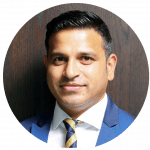We live in an era, where financial well-being matters a lot.
Thomas J Stanley, a respected researcher, advisor and author, well mentioned in one of his novels, “If you make good income every year and spend it all, it doesn’t mean you are getting wealthy. It means you are just living high.”
Do you think having wealth is the same as financial wellness?
You may compare yourself with others by measuring net worth or their possessions or money, but financial security is a feeling of having enough money to meet your financial needs. It is about being in control of your day-to-day finances and having the financial freedom to make choices that allow you to enjoy life.

Financial well-being is the foundation on which many other aspects of a family’s life are formed. A strong financial well-being has positive implications on educational achievement. It contributes to better health and also builds a stronger community for all. Financially stable families are able to work through every step of life, right from basic needs to connected and healthy older adults.
Why is Financial Wellness Important?
The state of financial well-being may look different to everyone, as most of the money matters are relative, but do not take it as having lots of spare money, because you don’t have to have lots of money to feel financially well. But, what makes it so important?
Financial well-being matters. It has the potential to impact all other elements in your life. You don’t need lot of money, but you do need enough money to choose to work in a job you enjoy; enough to decide when you need a break to spend time with your friends or family; enough to make healthy eating and lifestyle choices; enough to put aside, until you decide you want to make
a change, whether to start a family or to retire.

Financial wellness isn’t just about saving yourself from a debt and having a pension, it is about having a plan that covers today’s expenses as well as other expected and unexpected, twists and turns in your journey from today until then. Here are top 5 financial well-being tips to help you stay on top.
5 Top Financial Well-being Tips To Help You Stay On Top
1. Create a Financial Calendar: If you do not trust yourself in remembering to periodically pull a credit report or pay your quarterly taxes, setting appointment reminders for these important money to-dos can prove to be of great help to you. It is the same way you would plan for an annual doctor’s visit or a car tune-up. A financial calendar can be a good place to start.
2. A Closer Look At Credit Cards: Credit cards are known for their high interest rates. You can always check for a balance transfer offer to switch to a card with a lower rate. Before you opt for a credit card, make sure you read the terms and contract carefully, as you may not want to miss reading through high penalties for missing a payment. If you have multiple cards, decide on which debt-paying strategy works best for you. Some financial experts recommend paying off cards with the highest interest rates first, however others recommend paying off cards with the smallest balances first. You can try sending in payments throughout the month. Additionally, you must pay attention to interest rates, as it will help inform which debt or savings commitments you should focus on.
3. Start Budgeting: Creating a written budget and tracking your expenses is one of the best ways to save money and stop spending more than you earn. Understanding needs vs. wants, identifying take-home pay and expenses and prioritizing payments are the initial steps to creating manageable household budgets. Then, you need to figure out how much debt you have. You need an exact picture before you figure out the budget, create a debt reduction plan and open checking and saving accounts with mainstream banking resources. Next, you must note the difference between fixed expenses, needs, and wants. If you have debt, you must include repayment goals in the budget. You should try to factor in retirement and emergency savings if possible. You can save money by giving up morning coffee and cooking at home instead of getting takeaways. An alternate income like selling part-time work in the gig economy can also lend you a hand in balancing the budget.
4. Make Bite-Size Money Goals: It is believed that that the farther away a goal seems, the less sure we are about when it will happen and the more likely we are to give up. So, rather of just focusing on big goals like investing in a home, aim at smaller, short-term goals along the way that can help you reap quicker results. For instance, you can save some money every week in order to take a trip in six months. Additionally, savoring is like appreciating what you have now. So, instead of trying to get happy by acquiring more things, try to appreciate what you have.
5. Emergency Savings Funds: To have long term financial sustainability, it is crucial to invest in savings and build assets as a part of your financial well-being plan. Emergency savings funds allow you to handle unexpected emergencies. Lack of emergency funds can create tremendous setbacks, both for monthly expenses and long-term financial planning. For this, you can focus on increasing financial or tangible resources like savings, an investment in education or businesses or a home. These resources are an investment in your future. Retirement accounts are also a great source of investment in your quality of life as an older adult.
Knowing you have enough for today and enough for whatever might come with tomorrow is the heart of financial wellness. Keeping this heart pumping is like staying engaged with your money and having a plan for the future. This way you can know what you can afford, and what you might need to afford in the future.

Asfar is an Independent Financial Advisor and Associate Partner with Continental Group based in Dubai, UAE with over 12 years of experience in the region. His clientele includes high networth individuals, corporations, C suite executives, business owners, and entrepreneurs in the region.
Although with proper planning and consistent effort, you can save, invest and distribute your own finances. It is always good to get some professional advice. If you need help in planning your finances in the short, medium, or long term, I can help you do so. You can write to me with your questions and comments to asfar@profinancial.solutions
